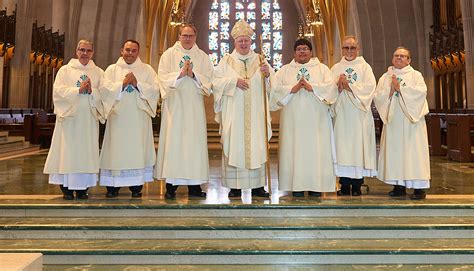Is the Diaconate Right For You? Find Your Answers
The call to serve God and His people is a profound one. For many Catholics, this call manifests as a desire to explore the diaconate, a path of ordained ministry within the Church. But the decision to pursue this vocation is deeply personal and requires careful discernment. This article will explore the key questions you should consider to determine if the diaconate is the right path for you.
What is the Diaconate?
Before diving into self-reflection, let's establish a clear understanding of what the diaconate entails. Deacons are ordained ministers in the Catholic Church, holding a permanent sacramental order. Their ministry is characterized by service, particularly to the poor and marginalized. They assist priests in liturgical celebrations and often lead specific ministries within the parish, such as preaching, teaching, and charitable work. While not priests themselves, deacons play a vital role in the life of the Church.
What are the Key Responsibilities of a Deacon?
The responsibilities of a deacon are multifaceted and demanding. They are called to:
- Liturgical Ministry: Assisting at the altar during Mass, proclaiming the Gospel, and preaching.
- Pastoral Ministry: Visiting the sick, offering spiritual guidance, and providing pastoral care to individuals and families.
- Charitable Ministry: Working with the poor, advocating for social justice, and engaging in works of mercy.
- Administrative Ministry: Assisting with parish administration and management.
This isn't an exhaustive list, as the specific responsibilities of a deacon will vary depending on the needs of their parish and their individual skills and talents.
Am I Called to the Diaconate? Spiritual Discernment
This is the most crucial question. Feeling a pull towards service is not automatically a sign of a vocation to the diaconate. True discernment involves prayer, reflection, and guidance from spiritual advisors. Ask yourself:
- Do I feel a deep calling from God to serve His people in this specific way? This is not a fleeting feeling but a persistent inner urge.
- Am I willing to commit to a lifetime of service and ongoing formation? The diaconate is not a temporary role; it requires lifelong commitment.
- Am I prepared to embrace the challenges and sacrifices involved? The diaconate demands significant time, energy, and dedication.
Seek guidance from your priest, spiritual director, or a trusted mentor. They can provide valuable insight and support throughout your discernment process.
What are the Requirements to Become a Deacon?
The specific requirements can vary slightly depending on the diocese, but generally include:
- Age: Typically, candidates must be at least 35 years old.
- Marital Status: Married men can be ordained as deacons, but celibacy is required for those who wish to pursue the priesthood.
- Education: Formal theological studies are usually required.
- Spiritual Maturity: A deep faith and a commitment to living a life of prayer and service are essential.
- Background Check: A thorough background check is conducted to ensure suitability.
What are the Personal Sacrifices Involved in Becoming a Deacon?
The path to becoming a deacon involves significant personal sacrifices. These may include:
- Time Commitment: Extensive study and formation are required.
- Financial Considerations: Tuition and other expenses can be substantial.
- Family Life: The demands of the diaconate can place a strain on family relationships.
It's crucial to openly and honestly discuss these potential sacrifices with your family and support network.
How Long Does it Take to Become a Deacon?
The formation process usually takes several years, typically involving a combination of academic study, spiritual direction, and practical ministry experience.
What is the Difference Between a Deacon and a Priest?
While both are ordained ministers, deacons and priests have distinct roles and responsibilities within the Church. Primarily, priests are able to celebrate the Eucharist (Mass), hear confessions, and administer certain sacraments that deacons cannot. Deacons primarily focus on service and assistance to priests and the community.
Is the Diaconate a Stepping Stone to the Priesthood?
While some deacons may later feel called to the priesthood, it's important to emphasize that the diaconate is a distinct and valuable vocation in its own right. It is not necessarily a prerequisite for the priesthood.
In conclusion, the decision of whether or not to pursue the diaconate is a deeply personal and prayerful one. Careful self-reflection, guidance from spiritual advisors, and a thorough understanding of the responsibilities and sacrifices involved are all crucial to making an informed choice. May God guide you in your discernment.

